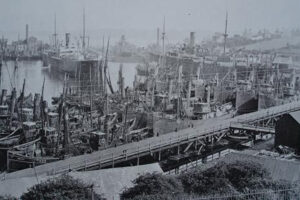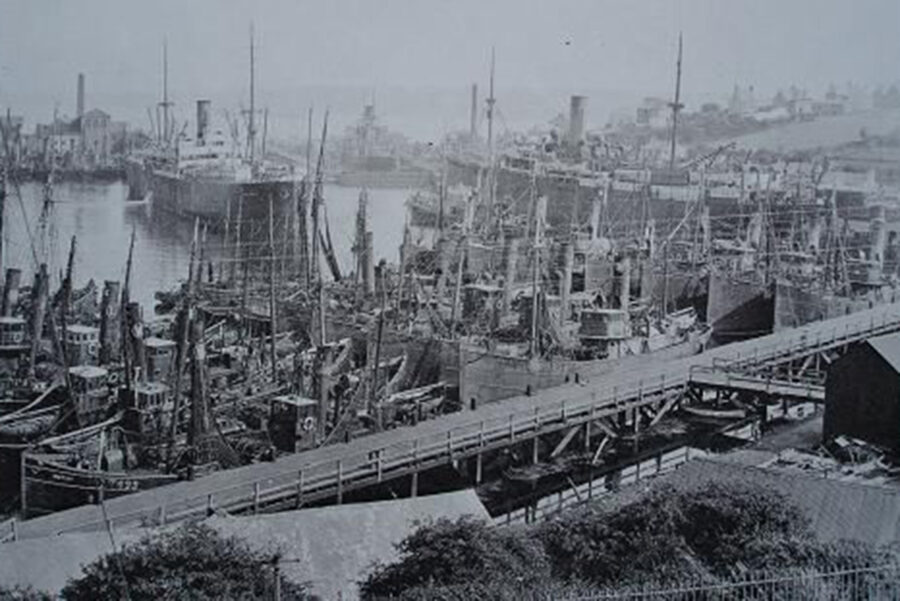The Welsh seafood sector needs urgent government support and increased funding if it is to survive, writes Plaid Cymru AM Mabon ap Gwynfor
The image of a fishing boat out at sea, bobbing along, pulling in its catch or lobster pots, has a certain romanticism about it.
Wales is surrounded on three sides by the sea, and our small coves and harbours have a long history, with many folktales and myths associated with stories from the sea. Coastal communities, like Nefyn, used to be nearly entirely dependent on fishing to sustain the families. In fact, the penwaig (herring) was so abundant off the north Llyn coast that they used to call it biff Nefyn – Nefyn beef.
Fishing and maritime heritage is part of our Welsh and British identities, but the stark truth is that fishing itself will soon become part of our folklore and something belonging to a bygone era if something is not done soon. Because fishing and its place in Wales’ coastal communities is disappearing in front of our eyes.

From Conwy and Amlwch in North Wales down to Milford Haven – shown here in the late 1930s – the once-booming Welsh fishing fleet, known and respected across the UK, has continued to reduce year on year. Brexit has accelerated the decline, decimating the Welsh mussel industry in particular.
I have made it one of my goals as an elected member of the Senedd to raise the profile of our seafood providers – be it fishing, aquaculture or processing, which is why I set about establishing the Senedd’s Cross Party Group on Fishing and Aquaculture (the Senedd’s equivalent to Westminster’s All Party Parliamentary Groups), with Seafish kindly carrying out the secretariat role.
It was at the second meeting of our cross-party group that we had a state of the sector report, and it was both sobering and alarming. In a brief half an hour we learnt that fishing in Wales is on life support.
In 2021, the active fishing fleet in Wales consisted of only 249 vessels, 5% less than the previous year, and representing only 1% of the total UK landing value. The total income of Welsh fishers in 2021 had fallen 12% year on year.
In Wales, much like the rest of the UK, we limit our seafood choices to the big five: cod, salmon, haddock, prawns and tuna. While we have a wealth of low-carbon, nutritious, protein-rich food in our seas, we ourselves rarely eat them, unless we’re on holiday in Spain, France, Italy or, as far as whelks are concerned, South Korea. But exports to these countries have fallen, largely due to Brexit and Covid.
While most people outside the industry probably have in their mind’s eye a picture of trawlers fishing for popular fish like cod, this image couldn’t be further from the truth here in Wales. In fact, 80% of the UK’s cod is imported, but in Wales we specialise mainly in shellfish such as whelks, lobsters and scallops. And the news isn’t good.
The value of the Welsh catch fell by nearly a third, 30%, in 2021. Whelks, king scallops, crab and thornback rays were all down significantly, with the value of the sole catch down a massive 92%.
Covid is a significant contributor to the fall in value experienced in 2020-21, as many restaurants closed, and exports were stopped. But this dramatic decline cannot be blamed on Covid alone.

Mabon ap Gwynfor.
Over the last 10 years we’ve seen Welsh fishing fleet landings reduced by 75% in weight and 41% in value.
The aquaculture sector in Wales has arguably suffered even more. Wales is famed for its delicious mussels, with the mussels from the Menai Straits world-renowned, yet Brexit has directly led to the near-total collapse of this sector, with a 98% decline in the value of Welsh mussels.
Overall, farmed finfish and shellfish saw an 82% fall in value between 2019 and 2021, with a near-total collapse in the tonnage produced from 3,100t tonnes to a mere 214t – a 93% decline.
This fall is reflected in our processing abilities, with processing firms seeing a decline in profitability and in their GVA. In 2021 there were only 28 full-time equivalent (FTE) jobs in the processing sector in Wales. Can you believe that? In a nation so rich in seafood and potential, we only employ 28 FTE in the seafood processing sector. That’s unbelievable. In Scotland, by contrast, they employ 7,789 in the processing sector.
Today fishermen, fish farmers and processors face added pressure from the increased price of fuel and energy, and huge inflation.
It’s clear that the sector is facing a terminal decline unless urgent action is taken to arrest this extraordinary deterioration.
The Welsh government has shown no understanding and little concern for any of these sectors over the last 10 years, with a threadbare department struggling to achieve even the most modest ambitions. It was, after all, a year later than the other nations of the UK in introducing a flawed funding scheme for fishers post-Brexit, which was only passed in the Senedd at the beginning of this month. It is a scheme that is far from what is needed by Welsh fishers, which is why I and my Plaid Cymru colleagues didn’t support it.
Those involved in the sector, from fishing or fish farming to processing, will tell you how difficult it is to get any form of support, and how they are left constantly battling to get their voices heard at all.
These sectors have so much potential. We have, without a shadow of a doubt, the best seafood in the world in our seas. Not only is it nutritious, but the food miles are extremely low and, managed properly, it can be a sustainable source of healthy food for this and future generations.
We need our government to support these sectors, not give platitudes about how good the produce is at food festivals or in glossy tourism brochures. But we also need to change our eating habits. We no longer know how to prepare crab, or even how to fillet a mackerel. We need to rediscover our appetite for our seafood, and support new processing businesses, to ensure we see beautiful fillets of Welsh sea bass or herring on the plates of Welsh families.
What is clear above all else is that we need to see direct and concerted support to fisheries and aquaculture in Wales before it’s too late.
This story was taken from the latest issue of Fishing News. For more up-to-date and in-depth reports on the UK and Irish commercial fishing sector, subscribe to Fishing News here or buy the latest single issue for just £3.30 here.
Sign up to Fishing News’ FREE e-newsletter here.








